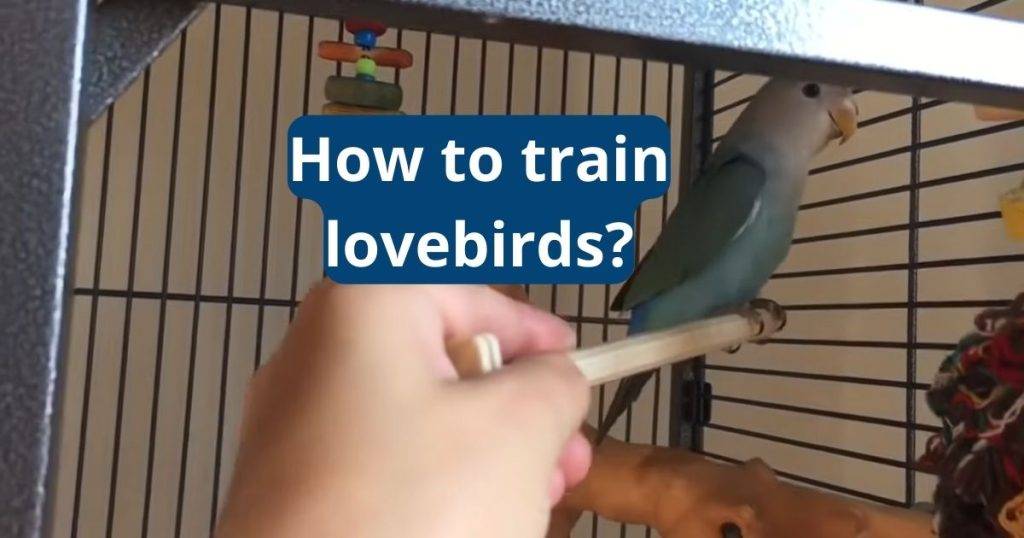How to Train Lovebirds?

Lovebirds can learn to imitate phrases and tunes, but the process will take time and patience. It will also help if the bird is hand-raised and tame. To train this trick, you will need to be able to target your lovebird with either your finger or a stick and to say “turnaround”. Praise and treats will be provided when the bird completes the spin correctly.
Get Your Bird to Trust You
It will take some time for your bird to get comfortable with you and your presence. You will need to spend time each day talking softly and slowly getting it used to your presence and hand.
Once your lovebird is used to your presence you will need to start training it. Start by extending your hand with food inside the cage, slowly getting it to accept the treat from your finger. Once it does, say ‘step up!’ or whatever command you prefer. Praise it when it steps up and offer more treats as a reward.
Repeat this process every day until your lovebird is comfortable stepping on your finger and can do so on command. This will allow you to transport it and can help prevent your bird from escaping as it will learn that there are rewards for following your instructions.
Set Realistic Goals
It can take time for a lovebird to get comfortable with you, especially if it is not used to spending much time outside the cage. However, if you train it with consistency and offer it small treats that it loves (such as safe nuts or certain seeds), you will eventually see its behavior improve little by little.
Teaching a lovebird to mimic your speech is a more advanced trick that requires patience and consistent training sessions. You should also keep in mind that lovebirds can have short attention spans, so it is best to train them for a few minutes several times throughout the day. This way, they will not get bored and will still be able to focus on your training sessions.

Use Positive Reinforcement
Lovebirds learn best when they are engaged and enjoying the training process. This will make them more likely to cooperate in the future, as well as help you develop a stronger bond with them. To keep your lovebird interested, use positive reinforcement during training sessions and end each session on a high note.
For example, if your Sun Conure has past experience of stepping onto your hand for food and does so this time, give it praise and a treat right away. This will reinforce the behavior and teach it to associate your hands with good things.
When your lovebird is comfortable with the click sound and relates it to a reward, you can start to train more advanced behaviors, such as fetching rings or picking up pegs by color. Be sure to break each step down into smaller parts, practicing each step individually until your bird masters it.

Don’t Overdo It
Lovebirds can get bored quickly, so make sure to limit training sessions to no more than 15 minutes per day. This will also keep the bird from becoming overexcited and less willing to cooperate.
During the training process, it’s important to use positive reinforcement. This means rewarding the lovebird with something it loves every time it does what you want it to do. You can do this by using treats, food, or head scratches.
When training a lovebird to step up on your finger, be patient and use gentle pressure. You don’t want to frighten the bird or cause it to fall off your finger. The bird should naturally lift its foot to stand on your finger when you say’step up!’. You may have to repeat the command several times before it learns.
Practice Regularly
Once your lovebird becomes familiar with your hand and finger, you can start teaching it more advanced tricks like stepping up. Using positive reinforcement and training sessions that aren’t too long is important as a lovebird can get bored quickly.
Talk to your bird softly and don’t yell at it, as this can damage the trust you have built up. Using treats or your soft voice to encourage it to come back to you is much more effective.
Spend time around your lovebird during the day to help it become familiar with you. Standing quietly near its cage will allow it to take in your scent, letting it know that you are not a threat. This will make it more comfortable in your presence and increase its willingness to cooperate during training sessions.




